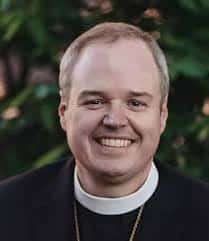Sean Rowe recently made a statement in which he said that the Episcopal Church, once the church of presidents, now must be an engine of resistance. To that we say, “Actually, the Episcopal Church is still the church of presidents. It’s just that presidents, like the rest of us, long ago quit attending, and have no plans to come back.
“As for resistance, the Episcopal Church isn’t the engine of anything, plus it has no street cred. So don’t bother.”
First, a disclaimer: This post isn’t about politics. While we are clear on our political views, Anglican Watch welcomes a range of perspectives.
At the same time, we believe it is possible to explore specific issues of injustice without regarding the underlying problem as one of being liberal or conservative, Democrat or Republican.
For example, cutting off food assistance to children is, we believe, wrong. Similarly, draconian cuts to medical care for older adults and those of limited means contradict the imperative to care for the poor, the oppressed, and the marginalized.
My example
As I’ve written previously, my great-grandfather, Rudolf Eder, was a prominent pastor who the Nazis killed due to his opposition to Hitler.
Every Sunday, he would preach against the evils of Nazism. And every Sunday, the Gestapo would sit in the back pews of the church, taking copious notes.
Invariably, after the service, the Gestapo would take my grandfather in for questioning. “What did you mean by ________?” was the inevitable follow-up.
In every instance, Eder’s response was the same: cite the relevant Bible passages and say, “That is what I was talking about.”
To be clear, Eder was not a liberal, far from it. In fact, he was profoundly conservative. Like 30-degrees-to-the-right-of-the-SBC conservative.
But he was clear that rounding up Jews was wrong. He was clear that free speech was a right. He knew that concentration and death camps were a terrible evil.
He was also not a member of a Confessing Church (a denomination or sub-group that wanted the Nazi regime to stay out of church business). He couldn’t care less about whether the government wanted to interfere with the church, because he was going to do what he thought was right, regardless.
The underlying problem with Rowe’s call for resistance
So, where does Rowe run off the rails with his call for the Episcopal Church to be an engine of resistance?
The answer is that the church cannot be an engine of resistance when it cannot get its ethical act together.
Just as a barn isn’t clean until we muck out the stalls, so too the Episcopal Church has no moral authority until it shovels out its own moral filth.
And yes, to be clear, we are thinking specifically of the denomination’s unwillingness to address clergy misconduct. Specifically:
- Title IV, the clergy disciplinary canons, are designed for a denomination with several hundred million members. Indeed, the canons are ludicrously labyrinthine and opaque, even as proceedings under Title IV move so slowly as to be farcical.
- Title IV has a spotty record when it comes to issues like child sex abuse, adult clergy sexual abuse, embezzlement, and drugs. Anything else has a consistent track record of being brushed off as “interpersonal conflict” and not of “weighty and material importance to the ministry of the church.”
- There is next to no accountability for bishops who ignore Title IV.
- The church makes no effort at due process for complainants, which is ironic given its criticism of gaps in due process involving deportations. In other words, if a Title IV judicial officer knowingly mischaracterizes a complaint and dismisses it on a pretextual basis, the complainant has no recourse.
- Speaking of due process, an inherent aspect of due process is transparency. For example, around 1641, the English abandoned the Court of Star Chamber, with its secret and arbitrary proceedings, as contrary to the rule of law and the notion of accountability. But the Episcopal Church has no such qualms, with 99 percent of Title IV proceedings treated as “confidential.” Moreover, the average person in the pew would be appalled at the petty back-and-forth behind the scenes and the glacial pace of proceedings. To be clear, clergy misconduct is rightly a matter of public concern.
- Episcopal clergy who ignore mandatory sex abuse reporting laws face no consequences.
- Despite recent amendments to Title IV forbidding retaliation, retaliation is the law of the land on Planet Episcopal for complaining about misconduct.
- While bishops like to claim they have little real power, the Title IV cases that move forward are selected largely on the whim of the relevant bishop diocesan. Tell her to pound sand and, if you are clergy, you surely will get your butt kicked. Commit a crime? You’re probably okay.
- Bishops love to say when it comes to problem clergy, “Oh, that is a matter for the wardens/vestry.” But we have yet to see anyone in those groups who isn’t a sycophant, an enabler, an empath, or a source of narcissistic supply. In other words, it’s how bishops say, “Call someone who cares.”
- There is a double standard in many dioceses. Specifically, a lay person accused of abuse is suspended immediately. But when it comes to clargy, bishops can and do ignore abuse altogether. Recall: The Episcopal Diocese of Alabama is still ignoring the allegations we passed along — to an intake officer — about Stephen McWhorter.
Speaking of, look at Haiti
Speaking of being an (ineffective) engine for resistance, look at the Episcopal Church in Haiti.
Indeed, when the church’s role in gun-running and smuggling in Haiti was exposed, how did the church respond?
Essentially, it responded by ignoring the matter.
+Todd Ousley basically said, “It’s too bad that the guy in charge of the Standing Committee is wanted on police charges. He’s still our boots on the ground.”
And to be clear, yes, we recognize that laity are outside the scope of Title IV. But clergy discipline and church governance are separate issues, and there’s no excuse for having an alleged criminal running the place.
After all, Todd Ousley himself insists that Title IV allows him to follow an alternative, “pastoral approach.”
So why not try this “pastoral approach” on for size?
“We are very sorry to learn of the allegations, and encourage you to turn yourself in immediately. We’ll provide pastoral care as best we can and will arrange a replacement for you as soon as possible.”
Meanwhile, if shrugging off criminal allegations is the Episcopal Church’s definition of being an “engine of resistance,” no thanks, you can keep it.
Personal reflections
Speaking of my great-grandfather, the pastor, his situation underscores just how badly the Episcopal Church often handles clergy misconduct.
Indeed, my grandmother, his daughter, was raped by a parishioner while a teen. My mother was the result.

Just like the Episcopal Church, which seemingly only takes sex seriously and then often blames the victim, my great-grandfather’s church promptly waded into the mess.
The outcome?
My grandmother, who was too young to understand what had happened, was excommunicated for having had extra-marital sex and forced to marry her rapist. Even worse, her rapist was, to use the clinical phrase, batsnot crazy.
So, hers was a lifetime of trauma, and several trauma-based life decisions that did not end well. Which is sad, as she was, by any objective measure, the best grandmother any child could have.
The moral of the story?
Far from being an “engine of resistance,” the Episcopal Church remains mired in its Madmen-era mindset in which the only corruption that counts is an extramarital affair, and even then, only if you get caught. Or dissing your bishop. And yeah, there are plenty of clergy disciplinary outcomes in the Episcopal Church akin to that of my grandmother.
And yes, there’s a layer of political correctness slathered on top. LGBTQ+ people are, in theory, welcome. Same for women. Ditto for BIPOC.
But when right beneath the surface, misogeny remains alive and well, and persons of color are nowhere to be seen because they “want to worship with their own kind,” and the priority is protecting the church’s reputation, we know the reality.
The reality is that the Episcopal church’s internal politics make the backroom maneuvering at a political convention look benign by comparison. And the Episcopal Church remains the church of presidents — it’s just that presidents, like the rest of us, quit attending long ago and have no desire to return.
Indeed, until the church gets its act together, we don’t care what the church thinks about current social policies—even if we happen to agree. And we don’t want the Episcopal Church to be an engine of resistance—if it cannot even get its own house in order, why would we want it involved in social issues?
We give up.
Eric Bonetti
Editor


Thank you for your words. I thought I was alone in objecting to “engine of resistance”. Today, on Facebook, a church member used those words. My words in reply to “engine of resistance” were, ” I am a Christian, we build bridges, not walls. “No Kings” protests, I am a Christian, There is only the “King of Kings.” Jesus was not resistant, he was resilient. We should be resilient. My reply, was taken down by the church and I am no longer able to see or write comments. I believe “Engine of Resistance” is a violent phrase. There is no room for violence in the Episcopal church.
I am so sorry to learn of your experience. Shutting down your comments is neither Christian, nor acceptable, nor helpful.
Eric B.
Editor